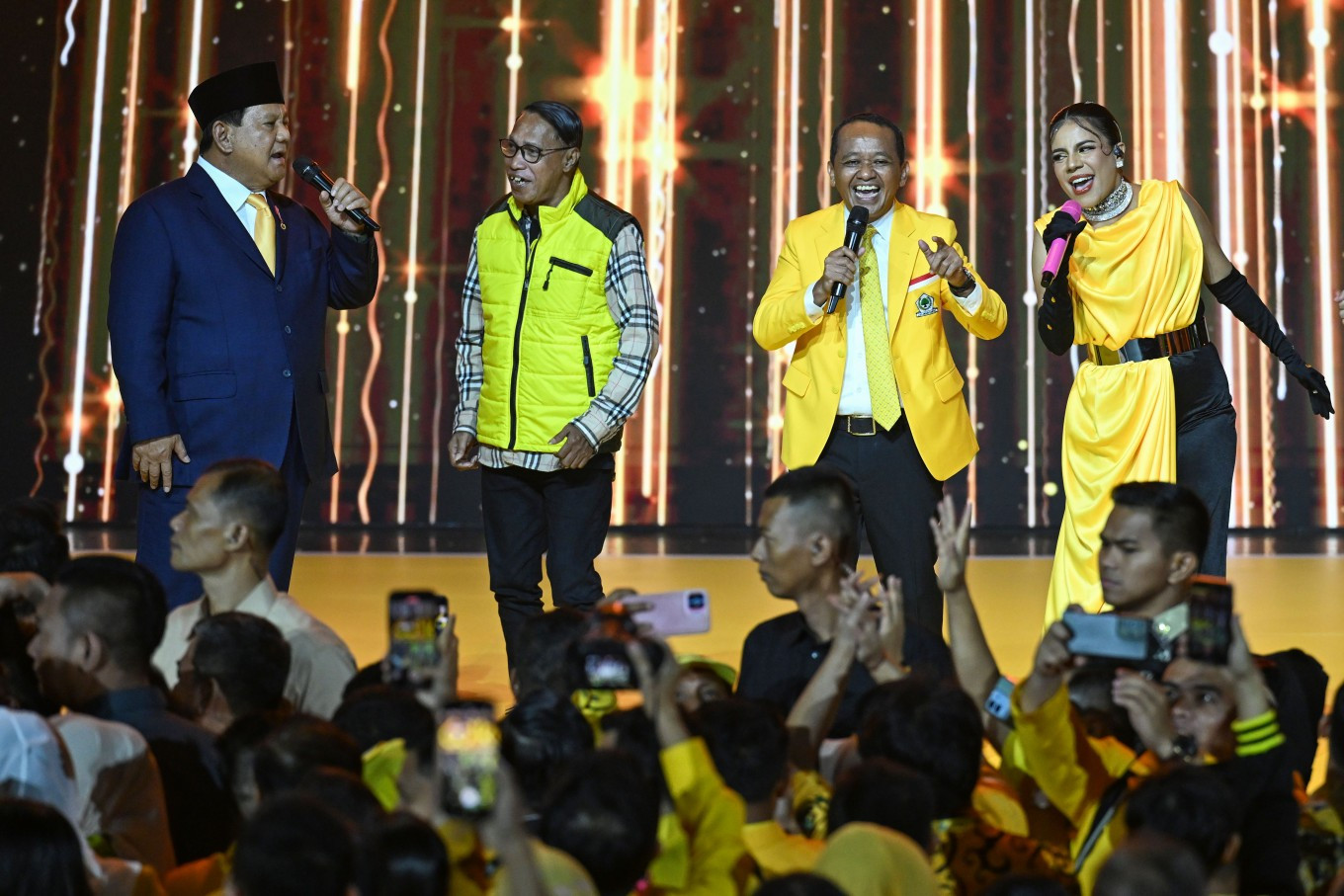News
The sly political maneuvers of Golkar and Bahlil
Tenggara Strategics May 14, 2025 President Prabowo Subianto (left), accompanied by Golkar Party chairman Bahlil Lahadalia (second right) and some singers, performs a song on Dec.12, 2024, during an event commemorating the Golkar Party's 60th anniversary in Sentul, Bogor, West Java. (Anta
President Prabowo Subianto (left), accompanied by Golkar Party chairman Bahlil Lahadalia (second right) and some singers, performs a song on Dec.12, 2024, during an event commemorating the Golkar Party's 60th anniversary in Sentul, Bogor, West Java. (Anta
Since taking office President Prabowo Subianto has focused on uniting Indonesia’s political landscape by forming a broad coalition called Onward Indonesia, which includes nearly every major party. To secure their support, he has granted key roles in his government to coalition allies, ensuring they share influence. Notably, the Golkar Party, led by Energy Minister Bahlil Lahadalia, received eight cabinet positions, with half of those roles filled by ministers who also served under Prabowo’s predecessor, Joko “Jokowi” Widodo.
Jokowi appointed Bahlil the energy minister just before the latter took over the Golkar’s top post, which was left vacant by Airlangga Hartarto who abruptly announced his resignation in August last year. Bahlil was named the Indonesia Investment Coordinating Board (BKPM) head for his role in helping Jokowi win his second term in 2019. Later in 2021, Bahlil became the first investment minister following the reorganization of the BKPM.
Observers, however, cited Airlangga’s resignation as an alleged power play by Jokowi to embroil the coordinating economic minister in a corruption scandal, forcing him to resign, and thus allowing one of “Jokowi’s men” to take control over the party.
At the time of his rise to Golkar’s chief job, Bahlil came under heavy scrutiny due to his unpopularity within the party. But as the party’s creed dictates that it must side with the incumbent government, Bahlil’s election was non-negotiable.
The question now is whether Prabowo, as the new president, shares a common thought with Jokowi about Bahlil. On several occasions, Prabowo mocked Bahlil in public, albeit jokingly, but on the other hand, the President entrusts his energy minister to implement his ambitious downstream industry program.
As part of the Idul Fitri celebration, Bahlil paid a courtesy visit to Jokowi at his house in Surakarta, Central Java, on April 8, when Prabowo was away in Malaysia to meet Prime Minister Anwar Ibrahim to discuss joint measures in response to the steep import tariff rise imposed by the United States. Bahlil's visit, as well as that of several other cabinet members, such as Coordinating Food Minister Zulkifli Hasan, to Jokowi quickly fueled speculation about their dual loyalty. It remains unclear whether Bahlil and the other ministers had informed Prabowo in advance about their trips.
But one by one, the ministers publicly expressed their unwavering loyalty to Prabowo. Zulkifli, who also chairs the National Mandate Party (PAN), stated his and the party’s full support for the Prabowo administration.
Following PAN’s declaration, Bahlil asserted that he and Golkar would stand behind the Prabowo-Gibran administration “until the end”. Bahlil added that the backing will persist for as long as Prabowo wishes it to. “If he wants two terms, however many, we can discuss it. No problem. No need to doubt,” said Bahlil confidently.
Bahlil’s announcement came on the heels of a petition filed by a group of retired military officers with Prabowo, asking for the impeachment of Vice President Gibran Rakabuming Raka, Jokowi’s son, and the dismissal of ministers connected with Jokowi. Bahlil has unequivocally opposed the demands, saying that Gibran’s election was final and “constitutional”.
With Golkar under Bahlil publicly endorsing Prabowo’s reelection in 2029, it will mark the third consecutive presidential race in which the party has failed to promote its own candidate. The last time Golkar fielded a contender was in 2009, when former vice-president Jusuf Kalla teamed up with former chief security minister Wiranto. The pair finished last, trailing behind Megawati Soekarnoputri who partnered with Prabowo, and eventual winner Susilo Bambang Yudhoyono and his running mate Boediono.
Since then, the party has opted to play it safe and remain in government coalitions, with a brief stint as opposition from 2014 to 2016 after backing Prabowo during the 2014 elections. Rather than pursuing higher ambitions, the party has opted to maintain its steady presence within the established political power structure.
This time it is no different. Golkar’s decision to continue backing the administration is a show of both loyalty to Prabowo and an example of the art of survival to keep its ministerial seats and access to resources intact. Bahlil’s ongoing close ties with Jokowi may cast doubt on his true loyalty, presenting a political hurdle for Prabowo as he attempts to tighten his grip on power.
What we've heard
According to internal sources linked to the Indonesian Military (TNI), Prabowo received a tip-off that Jokowi and Bahlil were engaged in a political deal, which was agreed upon when Bahlil paid a visit to Jokowi. Bahlil was accompanied by Golkar executive Wihaji, who is also the population and family development minister.

